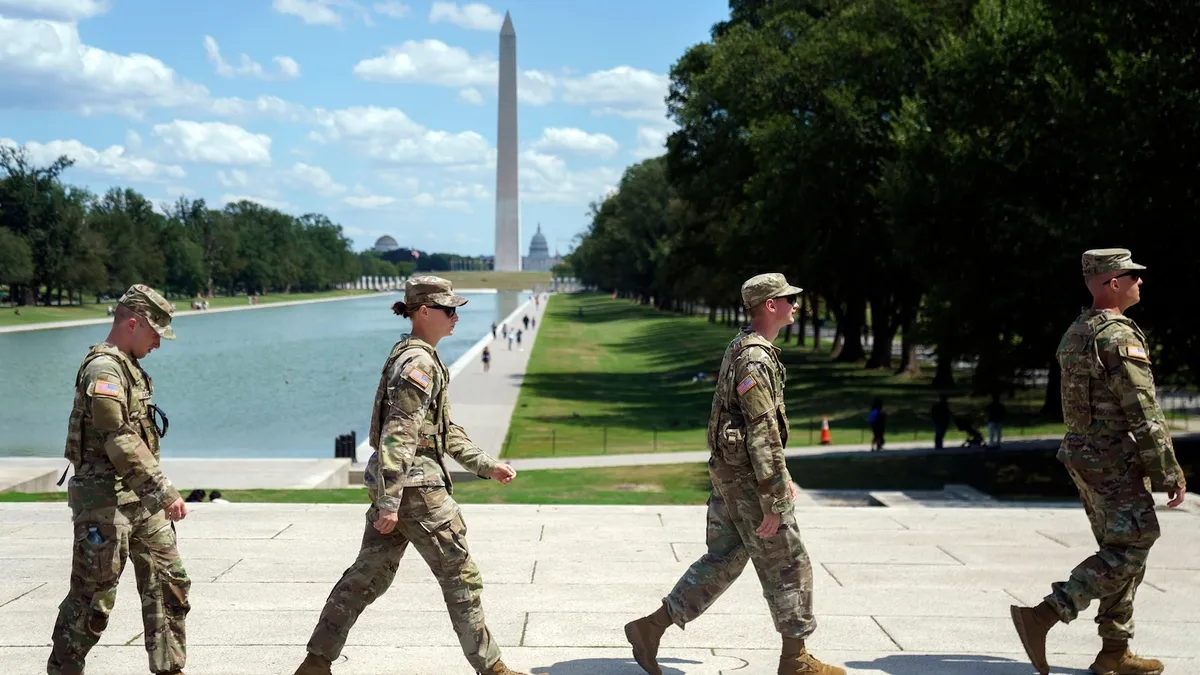
On Monday, President Donald Trump directed the Pentagon to establish National Guard units in Washington, D.C., and across the nation, aimed at mitigating civil protests and ensuring public safety. Historically, this responsibility has rested with civilian law enforcement. Critics have expressed concern that Trump's initiative to create a rapid reaction force for civil unrest is alarming, asserting that it oversteps legal boundaries typically assigned to the National Guard, which is primarily intended to assist in foreign conflicts or respond to major domestic crises such as hurricanes and floods.
In an executive order signed on Monday, Trump instructed Defense Secretary Pete Hegseth to appoint Army and Air National Guard members from each state who could be swiftly deployed to support federal, state, and local law enforcement in controlling civil disturbances and maintaining public order. The order emphasizes that such deployment should adhere to legal guidelines. Additionally, Hegseth is tasked with initiating the training and equipping of a specialized unit within the D.C. National Guard specifically dedicated to safeguarding public safety and order in the Nation's Capitol. This unit would have the authority to enforce federal law through deputization.
When approached for comment, the Pentagon stated that it is currently assessing the executive order and its implications. Retired Maj. Gen. Randy Manner, a former acting vice chief of the National Guard Bureau and a vocal critic of Trump's reliance on the National Guard for law enforcement, described the orders as unnecessary and politically motivated. “The administration is attempting to acclimate the American public to the presence of armed soldiers in military vehicles patrolling our streets,” Manner stated. He further articulated that the intention behind establishing Guard units is to exert control over American citizens, which he finds profoundly disturbing.
Retired Maj. Gen. Linda Singh, who commanded troops in Baltimore, Maryland, during the 2015 riots following Freddie Gray’s death, remarked that the National Guard already possesses the capacity to respond to civil unrest in crises. However, she warned that long-term military involvement in law enforcement could have severe repercussions, particularly if their communities oppose their missions. “What if escalations lead to civilian casualties? What if Guardsmen are harmed?” she questioned, emphasizing the lack of a clear plan to restore policing authority to local civilian entities. “We might be setting precedents that are irreversible,” Singh added.
This latest executive order from Trump follows the deployment of approximately 2,200 National Guard troops to Washington, D.C., under the claim that crime was escalating, despite local officials asserting that crime rates are at historically low levels. Since the deployment commenced, troops have primarily patrolled areas with lower crime rates, including the National Mall and several Metro rail stations. Armed with M17 pistols and M4 rifles, the troops are not engaging in arrests; rather, they are reporting security incidents to local police. Additionally, Guard members have been seen interacting with tourists and assisting in cleaning efforts near popular attractions.
Administration officials have defended the deployment as a means to allow police forces to operate more effectively in higher-crime areas. Trump has expressed his desire to extend this deployment strategy to other cities, such as Chicago. When addressing reporters, he suggested that Democratic governors should welcome the National Guard's presence, stating, “They should be saying, 'Please come in.'”
Under the Posse Comitatus Act, the military is generally prohibited from serving as law enforcement on U.S. soil, with rare exceptions. For example, in the case of Washington, D.C., troops deployed for a federal mission remain under the command of governors, exempting them from Posse Comitatus under a provision known as Title 32. The mobilization in D.C. relies on the cooperation of six Republican governors who have agreed to Trump's request for troops from their states to assist local law enforcement.
Trump's ability to send troops into states against the wishes of the governor is more restricted. In California, he invoked Title X, which provides the president with the authority to deploy National Guard resources to protect federal properties and personnel. The National Guard already maintains quick reaction forces in each state, capable of responding to crises as they arise. However, Manner argues that Trump seems to be advocating for units specifically designed to suppress civil unrest, contrasting with the National Guard's typical crisis response role. “They're going to be there to police Americans,” Manner concluded.
As of now, the White House and Pentagon have not disclosed any cost estimates for the National Guard's deployment in Washington, D.C., raising further questions about the financial implications of this controversial initiative.